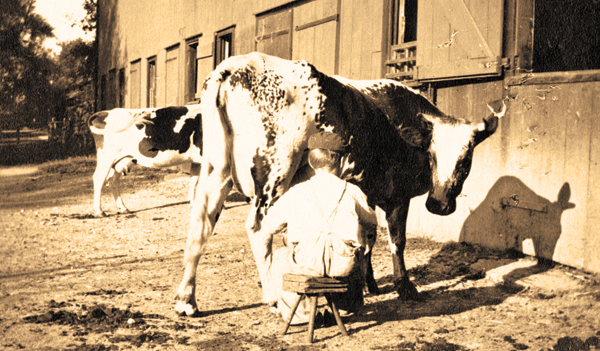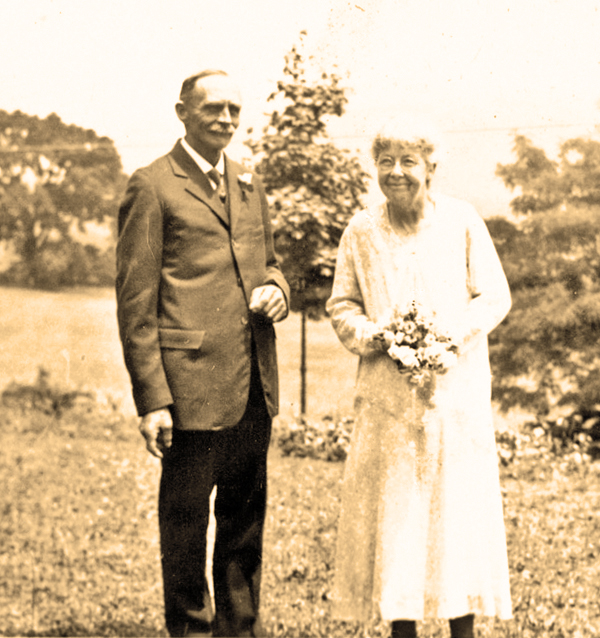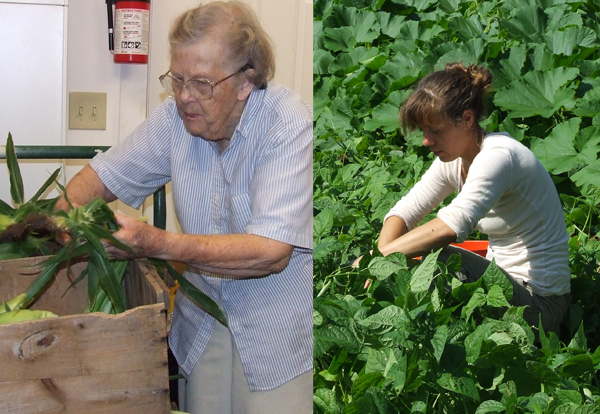

Businesses come and go, but one Cornwall mainstay has not only withstood the test time, it’s stayed in the same family for 100 years. Three generations currently work side-by-side to keep Jones Farm running – third generation farmers Doris Jones Clearwater and husband Belding, fourth generation farmer David Clearwater and his wife Terri, fifth generation Catherine Clearwater and husband Christopher, and part time help from fellow family members Kenneth, William, and Leslie.
In honor of the landmark occasion, the Jones Farm family invites the public to celebrate their centennial, with hayrides, refreshments, live music, and more, from 1 to 4 p.m. on Saturday, Sept. 13, at the Angola Road farm. Since its purchase in Dec. 1914, the farm has undergone a number of significant changes transitioning to the product that’s well known today. A part of the farm’s success can be attributed to the family’s ability to change with the times.
“The area is not the same as when I was a little kid,” David said. “It’s not the same as when my parents were little kids. The area has changed drastically. We used to be a blue collar working class community; now we’re not.”
Rather than complain about the changing times, each generation has made the effort to make sure the farm continues to remain viable.

When John H. Jones, and his wife, Alice, originally purchased the 85-acre property from Emily Cromwell, a direct descendant of Oliver Cromwell of England, they began operating it as a dairy farm. Evidence of the old hay lofts still exist in the barn. Their sons Raymond and Chauncey later transitioned from dairy into the egg and poultry business, raising over 7,000 chickens. The brothers grew an orchard and began selling fruit, eventually phasing out the poultry and adding vegetable gardens. The farm now offers a wide variety of fruits and vegetables such as apples, tomatoes, pumpkins, peppers, green beans, sweet corn, asparagus, rhubarb, watermelon radish, lettuce, kale, and even herbs.
In the late 1970s to late 80s, the farm was expanded to include a gift shop and art gallery. The gift shop is home to over 500 different companies offering home décor, candles, jewelry, toys, ladies clothing and accessories. The gallery features Terri’s original artwork. In the early 90s, an original chicken house was converted to a frame shop and a kitchen and bakery were added to the main building. Initially, the bakery was only going to offer fudge and donuts, but as the needs of the community changed, the bakery expanded exponentially.
The changes don’t stop there. In about a year, the gallery will be connected to the main building. A café is expected to open sometime this fall in the main building. Items such as wraps, salads, and soups will be sold for breakfast and lunch. The menu will reflect what’s in season, featuring home-grown products. The café will overlook the vast gardens, fields, and orchards, as well as Schunemunk Mountain.
After buying a tasty treat in the bakery, it’s not uncommon for a visitor to ask where they can go to eat.
“We get so many people who travel up for the day from the city,” Catherine added. “It’s ideal to keep them here for the whole afternoon, if we can.”
As the three generations have realized, running a multi-faceted farm isn’t easy and no day is ever the same.
“You might be out in the garden first thing in the morning, or you might be in the bakery,” David said. “You might be behind the counter, you might be cleaning, or you might be unloading trucks. It all depends. It varies every day. We wear a lot of different hats.”
A typical day starts around 5 or 6 a.m. and doesn’t end until after the sun goes down, even after the farm closes to the public at 6 p.m.
“Animals have to be taken care of whether you feel like getting up in the morning or not,” David said. You have ducks, chickens, horses, pigs, and goats. They all have to be fed, watered, and cleaned.”
Living within one mile of the farm and being around each other seven days a week, it seems only natural the Jones/Clearwaters, like any other family, will have their ups and downs and ins and outs. But it’s how the family members deal with those stumbling blocks that have helped them build a successful business. David likens running a family business to a marriage.
“Marriage is a commitment to love. It’s the same thing in a family business. Sometimes you might not like the person very much, but you love that person and you approach it accordingly. You choose to make it work. I think there are so many people in marriage, and in business, who, when they hit the first stumbling block, call it quits. You can’t do that. It just doesn’t work that way.”
With four generations preceding her, Catherine shares her reason why making the business work is important to her.
“It’s not just about you in the present. When you’re in a multigenerational family business, you have a different kind of respect for what you’re doing and an appreciation of the generations before you who have done the same things. I think there’s a stronger will to keep it going.”
The family can’t take all the credit for the farm’s success, however. Much of that has to be granted to the public which has supported the farm for generations, despite the multitude of choices when it comes to shopping destinations.
“We’re grateful people choose to keep us here,” Catherine said. “Whether it’s choosing to come here for fresh vegetables rather than the grocery store, or choosing to get a special gift instead of just going to one of the big box stores, we appreciate that. That’s what keeps us here.”

